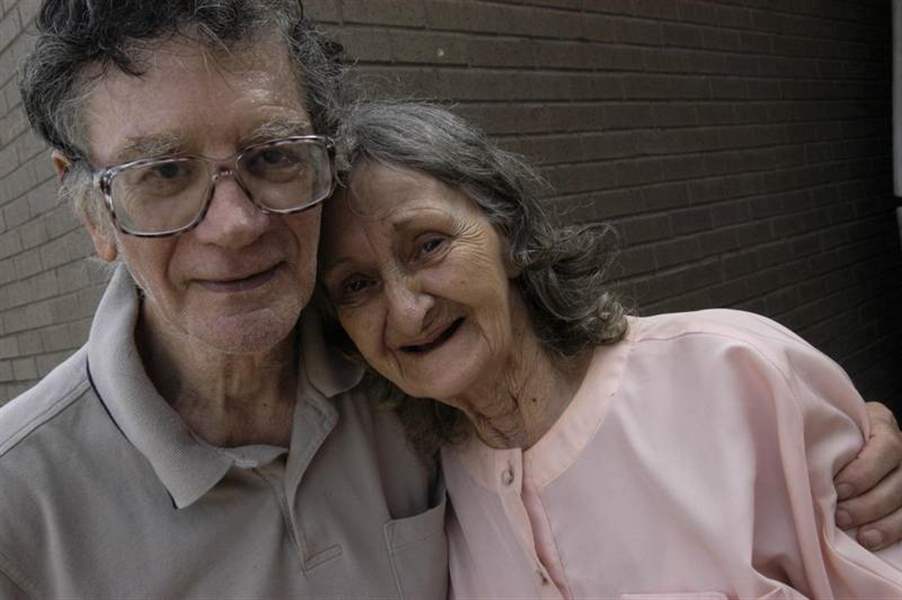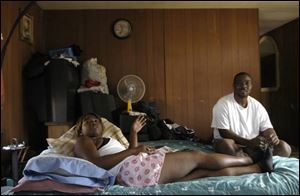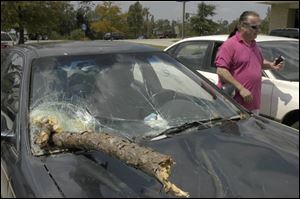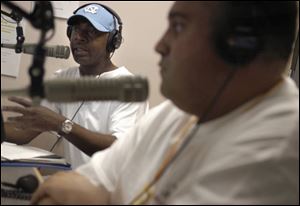
Disbelief, determination surface among Katrina survivors
9/11/2005
Bernard and Olive Aronstam were reunited with her son from South Africa, who caught up to them through a Blade/Post-Gazette story and a Web site that helps familites contact survivors.

Owanna Brown and Robert Hooker stayed in his trailer in Gulfport, Miss., when Katrina struck. Unlike nearby mobile homes, theirs wasn t shredded. Then they fled rising water.
GULFPORT, Miss. In the aftermath of Hurricane Katrina, everyone has a tale to share. Unlikely survival stories. People feared lost, then found. Small rays of humor amid so much despair. And interesting perspectives on a natural disaster like none other.
For example, anyone in these parts will tell you that the last place to be during any significant storm is inside a mobile home. So word of Katrina s eminent arrival sent all residents of the Brookwood Trailer Park in Gulfport, Miss., scurrying for safety.
All except two, Robert Hooker and Owanna Brown, who for reasons they could not explain decided to test fate in Mr. Hooker s trailer.
In Gulfport, Katrina s winds topped 150 mph and the Gulf of Mexico s surge exceeded 20 feet, leveling and damaging much of the city. Mobile homes behind, across the street, and next door to the Hooker trailer were shredded into pickup sticks.
Mr. Hooker said he was certain he and his girlfriend weren t going to make it.
It was rocking and shaking and vibrating. We were all over the trailer, running back and forth from one place to another, he said.
Ms. Brown said Katrina blew for about 40 minutes. It felt like 40 years.
Somehow, Mr. Hooker s trailer survived the wind. But another threat immediately followed. Fast-rising water began to seep into his home, spurring Mr. Hooker into action.
I wasn t going to risk the water, he said.
He hoisted his girlfriend onto his back and started walking north as fast as he could, finally reaching safety far from his home, exhausted but elated.
On Tuesday, Mr. Hooker and Ms. Brown returned to their home with Ms. Brown s family to clean out its soggy contents and consider their future. Except for a mattress brought from elsewhere and a few chairs, all their possessions were stacked outside, beyond saving and waiting to be hauled away.
Mr. Hooker said he hoped to stay in Gulfport and eventually return to his job at a local furniture store, which was demolished by Katrina.
Joe Spraggins, Ms. Brown s stepfather, said he and his wife, Tammy Spraggins Ms. Brown s mother and her son, Vanquezz Brown, were leaving town for good.
I ve lived here 25 years. I ve had enough of these hurricanes, Mr. Spraggins said.
Looking around the mobile-home park at all the shattered homes and then at Mr. Hooker s relatively intact home he shook his head.
Someone said: They were lucky.
Mr. Spraggins disagreed.
They weren t lucky, they were blessed, he said.
The speared vehicle
When Greg and Crissy Avery pulled into the Walgreen parking lot in Covington, La., Monday afternoon, heads turned, as they had every day for a week.

Greg Avery of Covington, La., still runs errands despite the customizing job Hurricane Katrina did on his family's vehicle. The Averys said the rest of their property was undamaged.
While the Averys were taking shelter in their nearby log cabin during the storm, Katrina sent a five-foot section of cedar into their car, spearing the windshield before lodging in the dashboard.
The tree missed all the vitals and left room for Mrs. Avery to squeeze into the passenger seat, allowing the couple go about their daily chores. The spectacle of the speared vehicle about three feet of trunk juts out from the windshield has made for lively, humorous banter during an otherwise depressing time.
Mrs. Avery said she s been surprised at the most frequently asked question.
It s always, How did it happen? Not, Are you OK?
Practically everyone wants to photograph the car. The Averys, understanding that any diversion at this moment is a good thing, don t mind.
Their backseat filled with supplies, the Averys said they were on their way to an evacuee shelter in nearby Slidell, La.
As entertaining as their tree story was, the Averys had a more compelling tale.
Mr. Avery recently retired after working 30 years as an attorney. The couple, in a spontaneous decision, sold their home in Metairie, a New Orleans suburb, and moved to Covington six months ago.
Their former home was in eight feet of water on Monday, beyond repair.
It s the strangest ... thing, Mr. Avery said.
Said Mrs. Avery: It s an act of God.
The radio station
When Katrina struck Louisiana s Gulf Coast, the power vanished, leaving people no means of contacting one another.
Separated families frantically sought help and news about how and where to find food and shelter and any other information that would help them survive.

A.J. Appleberry and Deke Bellavia have been on the air for WWL since the hurricane reached shore. The New Orleans station moved to Baton Rouge in order to continue broadcasts.
Into the void stepped WWL, an AM New Orleans news-talk-sports radio station. The station s office was damaged in the storm, so it was moved to Baton Rouge and began a 24/7 hot line.
When Lee Mayfield and Paul Chapman went missing, afternoon hosts Loretta Petit and Deke Bellavia asked listeners to help track them down.
It was on WWL that residents first heard local politicians slam the Federal Emergency Management Agency s response to residents stuck in New Orleans.
On Friday, reporter Kaare Johnson broadcast a report from New Orleans Gentilly neighborhood where he was raised describing water levels at eight feet and telling residents to expect the worst if they return.
On a brighter note, in the first normal news in 13 days, the farmer s market in Slidell, La., opened yesterday, which perked up the exhausted hosts.
Caffeine, sugar, and adrenaline have kept us going. [But] a few felt like they were on the verge of falling asleep on the air, reporter Chris Miller said.
The station s most impressive accomplishment has been bringing people together mothers with their children, husbands with their wives. People call every day to say thanks.
This is a great job to have; I m happy to be able to help, host Todd Memesses told listeners on Friday.
The reporters
Hundreds, perhaps thousands, of journalists from across the country and around the world have descended on the Gulf Coast to cover America s tsunami.
They will file their stories and then return to their safe, dry, intact homes and move on to the next disaster.
But at its core, Katrina is a local story being covered by local reporters from places like Pascagoula, Gulfport, Biloxi, Baton Rouge, and New Orleans. Some of the reporters have lost their homes and most everything they own. All have tried to set aside their personal feelings and go about their business.
It hasn t been easy.
Arthur Lauck, a 35-year-old photographer for The Advocate in Baton Rouge, was raised in New Orleans and considers it home. Beginning Aug. 28, the day before Katrina struck, Mr. Lauck spent seven straight days in the city documenting the storm, the levy breaks and flooding, the chaos at the Superdome and convention center, where thousands were stranded without food, water, and hope.
The horrific scenes tugged at his heart after all, this was his city but he kept on shooting.
I had to, he said.
Subsequent acts of violence, when marauding thugs terrorized helpless survivors, triggered another emotion in Mr. Lauck. Anger.
His city had become, he said, like The Lord of the Flies.
By yesterday, Mr. Lauck was spent, having slept and eaten too little, smoked too much, and witnessed enough heartache for a career in two weeks.
Earlier, he recalled that in the past, when he crossed the Lake Pontchartrain Causeway on his way into New Orleans, he always, without exception, felt a lift, a tinge of excitement, as the Big Easy cast its uplifting spirit over him.
When he entered the city the other day its lights dark, its music silenced, and its 500,000 residents replaced by 12,000 troops and law enforcement officials Mr. Lauck experienced a different feeling, one he can t shake.
The city is dead, he said.
Rescuing Mom and Dad
Bernard and Olive Aronstam left their New Orleans home the day before Katrina and headed for safety in Mississippi. There they ended up at a shelter in D Iberville, where they waited out the storm, before being transferred to another shelter at Biloxi High School.
Mr. Aronstam, 72, left frail and confused by the sudden turn of events, had his hands full with his 82-year-old wife, who suffers from Alzheimer s disease.

Bernard and Olive Aronstam were reunited with her son from South Africa, who caught up to them through a Blade/Post-Gazette story and a Web site that helps familites contact survivors.
He wanted to go home to New Orleans, an impossible request. Worse, the Aronstams had few relatives and none knew their whereabouts.
Meanwhile, Mrs. Aronstam s only child, Gary Probert, a South African wine farmer, left for Kansas City on Sept. 1 after he couldn t reach his parents, South African natives who moved to New Orleans 28 years ago.
In Kansas City, where his daughter, Inga Raw, lives, Mr. Probert found out that his parents Lakeview neighborhood was under water. He posted messages on the Internet asking for information to find them.
On Sept. 4, a meeting between the Aronstams and a reporter/photographer team from The Blade and the Pittsburgh Post-Gazette at the shelter resulted in an article that was read by Dawn Fox of Marietta, Calif. As a volunteer for Lifelist an organization created to bring disasters victims and their families together Ms. Fox had been combing the Web for news on separated families. She saw the Blade/Post-Gazette story, found Mr. Probert s message, and called him in Kansas City.
Tuesday at 4 a.m., joined by his daughter s friend, Dan Severin, Mr. Probert left for Biloxi.
By then, a number of the evacuees at the high school shelter where the Aronstams were had been moved to shelters in Alabama, Florida, and elsewhere. Around noon on Tuesday, shelter officials told the couple they wanted to move them to Clearwater, Fla.
Mrs. Aronstam refused to leave, Mr. Probert said.
By 7 p.m. her son arrived and the family was reunited.
Wednesday they left for Kansas City.
It was really cool, Mr. Severin said.
Mr. Probert said his mother needs professional care, which she will receive in Kansas City, with his daughter nearby. Mr. Aronstam will travel with Mr. Probert to South Africa to be with Mr. Aronstam s older brother.
He needs to regain his strength. Once he does, we ll figure out what we re going to do, Mr. Probert said.
Post-Gazette photographer Martha Rial contributed to this report.
Contact George Tanber at: gtanber@theblade.com or 419-724-6050.